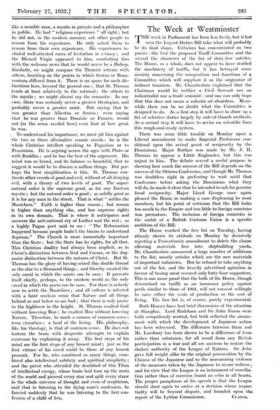The Week at Westminster
THE week in Parliament has been less lively, but it has
seen the Import Duties Bill take what will probably be its final shape. Criticism has concentrated on two points—the first the proposed Tariff Committee and the second the character of the list of duty-free articles. The House, as a whole, does not appear to have studied the machinery of tariffs, but it has betrayed some anxiety concerning the composition and functions of a Committee which will supplant it as the originator of indirect taxation. Mr. Chamberlain explained that the Chairman would be neither a Civil Servant nor an industrialist nor a trade unionist—and one can only hope that this does not mean a reductio ad absurdum,. Mean- while there can be no doubt what the Committee is designed to do. As a first step it will have to draw up a list of selective duties largely by rule-of-thumb methods. As a second step it will have to revise on scientific lines this rough-and-ready system.
There was some little trouble on Monday upon a Liberal amendment to, make Imperial Preference con- ditional upon the actual grant of reciprocity by the Dominions. Major Nathan was made by Mr. J. H. Thomas to appear a Little Englander, but this was unjust to him. The debate served a useful purpose in showing how much the success of the Bill depends on the success of the Ottawa Conference, and though Mr. Thomas was doubtless right in preferring to wait until that Conference before asking the Dominions what they will do, he made it clear that he intended to ask for genuine fiscal reciprocity. Major Lloyd George once again pleased the House in making a case displeasing to most members, but his point of criticism that the Bill looks too much to the Empire and too little to foreign countries was premature. The inclusion of foreign countries in the ambit of a British Customs Union is a specific ambition of the Bill.
The House reached the free list on Tuesday, having already shown its attitude on Monday by decisively rejecting a Protectionist amendment to delete the clause allowing materials free into shipbuilding yards. Mr. Chamberlain announced a large number of additions to the list, mostly articles which are the raw materials of important industries. But he refused to take anything out of the list, and the heavily advertised agitation in favour of taxing meat secured only forty-four supporters. This is one more proof that the bulk of the House, though determined on tariffs as an insurance policy against perils similar to those of 1931, will not consent willingly to raise either the costs of production or the cost of living. The free list is, of course, purely experimental.
Both Houses have had brief discussions of the situation at Shanghai. Lord Hailsham and Sir John Simon were both scrupulously neutral, but both reflected the amaze- ment with which the development of Japanese action has been witnessed. The difference between them and Mr. Lansbury has been shown to be a difference of form rather than substance, for all recoil from any British participation in a war and all are anxious to restore the shaken authority of the League of Nations. Sir John gave full weight alike to the original provocation by the Chinese of the Japanese and to the unreasoning violence of the measures taken by the Japanese to secure redress ; and his view that the League is an instrument of concilia- tion rather than of coercion found an echo in all hearts. The proper paraphrase of his speech is that the League should start again to 'arrive at a decision whose impar- tiality will be beyond dispute, and founded upon the report of the Lytton Commission. Curros.


































 Previous page
Previous page